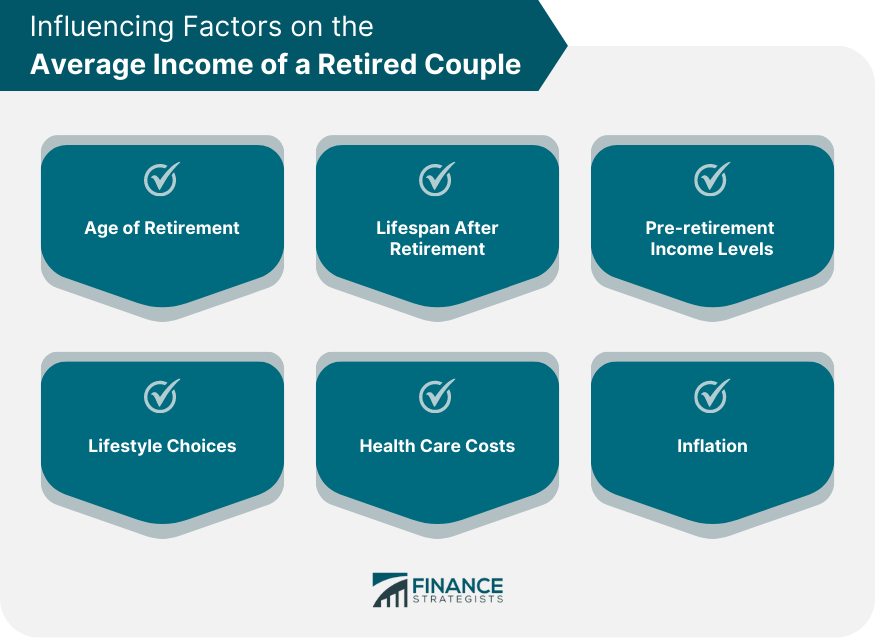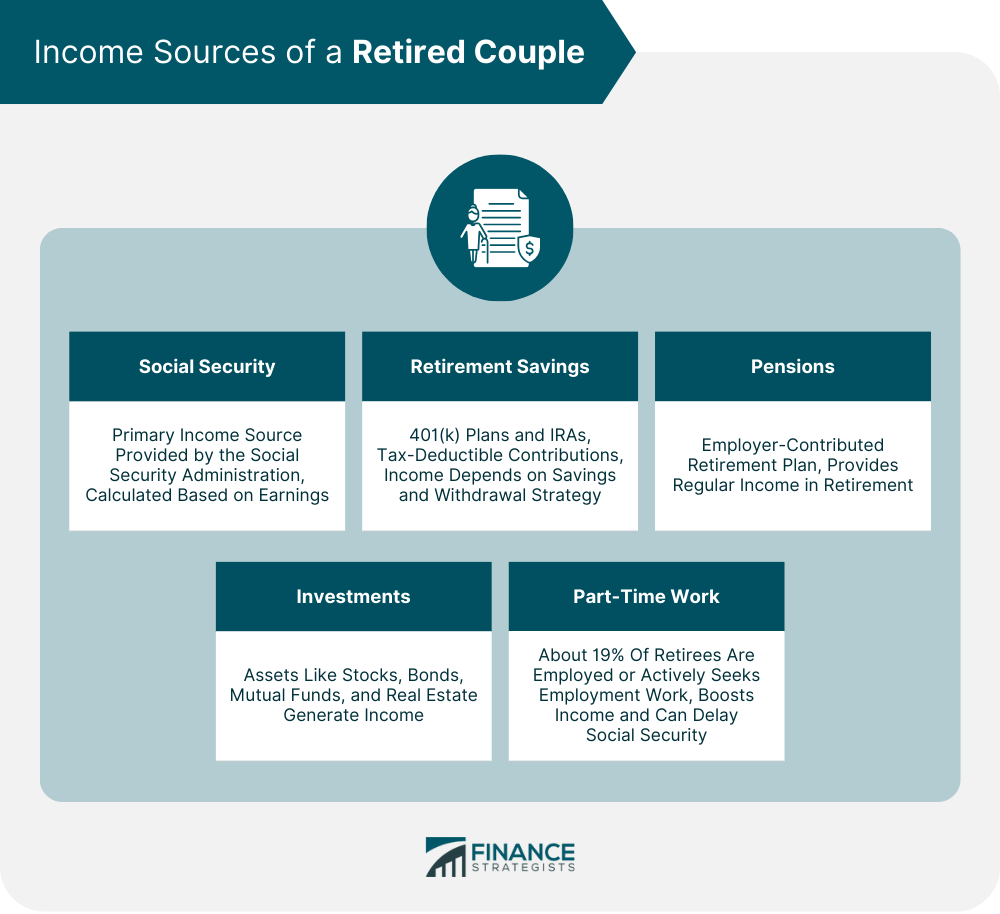The average income of an individual 65 and over was $50,290 in 2022 according to the latest United States Census Bureau. Considering a retired couple (two people), and assuming both individuals have the median income for their age group, the total household income would be $100,580. However, this may not be entirely accurate as income dynamics can be different for couples, with often one partner having more or less income than the other. It's important to note that income can vary widely among retired couples based on factors such as retirement savings, pensions, and Social Security benefits. Additionally, different countries and states have varying levels of social security benefits, which can greatly impact retirement income. Apart from individual factors, broader economic factors also influence retirement income. These include economic prosperity, cost of living, taxation rates, the proportion of elderly population, and the extent of income inequality. According to National Institute on Retirement Security, women aged 65 and older typically earn 25% less than their male peers. This income disparity grows with age, reaching a 44% difference in favor of men by the time they reach 80 years old and beyond. As a result of this widening gap, women over 65 are 80% more likely to experience poverty compared to men, with women aged 75 to 79 being three times as likely to fall into poverty compared to men of the same age group. The gender income gap has serious implications for the average income of retired couples. If one partner, typically the woman, has significantly lower retirement savings, the couple's overall income may not adequately cover their needs, particularly if the male partner predeceases his female partner, which is common given women's longer life expectancy. The age at which a couple retires can significantly influence their average income in retirement. Those who retire early might receive less from Social Security or pensions, as these are often calculated based on the number of years worked. Delaying retirement can allow couples to accumulate more savings and increase their Social Security benefits. Life expectancy plays a critical role in determining a retired couple's income. Living longer means that retirement savings need to stretch over a more extended period. With the rise in life expectancy, many retirees risk outliving their savings, leading to a reduced average income in the later years of retirement. The income level before retirement is another crucial factor. Higher earners typically receive more from Social Security and are more likely to have substantial savings and pensions, leading to a higher average retirement income. Retirement doesn't look the same for everyone. Some choose a quiet life in a paid-off home, while others travel the world. These lifestyle choices can dramatically affect a retired couple's average income requirements. Health care costs can significantly eat into a retired couple's income. As we age, health expenses tend to rise, and for some, long-term care may be needed. Couples must account for these potential costs in their retirement planning. Finally, inflation can erode purchasing power over time. A retired couple might have an income that seems sufficient today, but with rising prices, their income might not stretch as far in future years. It's crucial for retirement planning to consider the potential impacts of inflation. Social Security benefits are a primary income source for many retired couples. The Social Security Administration provides benefits to retired workers who have paid into the system during their working years, offering a baseline of income in retirement. The amount a couple receives from Social Security depends on their lifetime earnings, the age at which they start claiming benefits, and their marital status. The benefit amount is calculated based on the 35 highest-earning years of a person's career. If you claim benefits before your full retirement age (which varies based on your birth year), your benefits will be permanently reduced. Conversely, if you delay claiming past your full retirement age, your benefits will increase until age 70. Retirement savings accounts such as 401(k) plans and Individual Retirement Accounts (IRAs) are vital income sources for retirees. A 401(k) is provided by employers, while IRAs can be opened by individuals. Contributions to these accounts are often tax-deductible, and earnings grow tax-deferred until retirement. The income from retirement savings accounts depends on the amount saved and the withdrawal strategy used. The commonly recommended withdrawal rate is 4% of the initial balance, adjusted each subsequent year for inflation. However, market conditions and personal circumstances can affect this strategy. A pension is a retirement plan where an employer contributes money to a pool of funds set aside for a worker's future benefit. The funds are invested on the employee's behalf, providing a regular income in retirement. However, pensions have become less common as many employers have shifted to 401(k) plans. For those lucky enough to have a pension, it can significantly boost average retirement income. Pension benefits vary widely but can provide a reliable source of fixed income throughout retirement. Common types of investments include stocks, bonds, mutual funds, and real estate. These assets can generate income through dividends, interest, rent, or capital gains. Investments can play a significant role in generating income in retirement. The income generated can depend on market conditions and the types of assets held. A well-diversified portfolio can provide a mix of growth (from stocks) and income (from bonds and dividends). According to the latest data from Pew Research, 19% of individuals aged 65 and above were either employed or actively seeking employment, in contrast to the 10 percent recorded in 1985. Many retirees choose to work part-time or as consultants in their former fields. Continuing to work can significantly boost a retired couple's average income. It not only provides additional money but also allows couples to delay claiming Social Security benefits, potentially increasing their future benefits. The income a retired couple needs largely depends on the lifestyle they plan to lead. Basic needs such as housing, food, and healthcare must be met first. However, for comforts beyond the basics, like travel, dining out, or pursuing hobbies, more income is needed. The average income during retirement plays a crucial role in determining a couple's retirement lifestyle. It can dictate where they live, the experiences they can afford, and their overall quality of life. Income in retirement influences what retirees can do with their free time. Those with a higher income can afford to travel more extensively, pursue costly hobbies, or participate in more leisure activities. Those with lower incomes may need to find less expensive pastimes or limit their travel. Financial planning is vital for a comfortable retirement. This means setting aside money regularly, investing wisely, and aiming to increase earnings over time. Starting early and taking advantage of compound interest can greatly increase retirement savings. Diversification is another important strategy. This means having a mix of income sources in retirement, such as Social Security, retirement savings accounts, other investments, and part-time work. This can provide a safety net if one source of income diminishes. Continuing to work part-time or as a consultant during retirement can not only provide extra income but also keep retirees mentally active and socially connected. It's crucial, however, to find a balance between work and leisure to fully enjoy the retirement years. Understanding the average income of a retired couple requires exploring various sources of income, including Social Security benefits, retirement savings accounts, pensions, investments, and part-time work. The lifestyle, location, and healthcare needs of the couple can significantly affect their average income. Additionally, gender income disparities and the age at which a couple retires can also play crucial roles. Knowing the average income of retired couples is essential for retirement planning. It provides a benchmark that future retirees can use to estimate the income they'll need to maintain their desired lifestyle. It also underscores the need for saving, investing, and planning to ensure financial comfort in later years. The more you understand about retirement incomes, the better you can plan for your future. Consider consulting with a financial advisor or retirement planning service to help you navigate your path to a comfortable and fulfilling retirement.Average Income of a Retired Couple
Gender Gap in Retirement Income
Influencing Factors on the Average Income of a Retired Couple
Age of Retirement
Lifespan After Retirement
Pre-retirement Income Levels
Lifestyle Choices
Health Care Costs
Inflation

Income Sources of a Retired Couple
Social Security Benefits
Overview
How Social Security Benefits Are Calculated
Retirement Savings Accounts
Types
How Retirement Savings Contribute to Average Income
Pensions
Explanation and Prevalence
Impact on Average Income
Investments
Common Types
Role in Income Generation
Part-Time Work or Consultancy
Statistics on Retirees Who Continue Working
How This Affects Average Income

How the Average Income of Retired Couples Affects Lifestyle
Income Needed for Basic Needs vs Luxury
Role of Average Income in Determining Retirement Lifestyle
How It Influences Travel, Hobbies, and Other Retirement Activities
Preparing for Retirement: Strategies to Increase Income
Financial Planning and Saving for Retirement
Diversifying Income Sources
Consideration for Continued Part-Time Work or Consultancy
The Bottom Line
What Is the Average Income of a Retired Couple? FAQs
According to the United States Census Bureau, the average income for individuals aged 65 and over in 2021 was $47,620, which means a retired couple with both individuals having the median income for their age group would have a total household income of $95,240.
Several factors can influence the average income of a retired couple, including the age of retirement, lifespan after retirement, pre-retirement income levels, lifestyle choices, healthcare costs, and inflation.
The average income of a retired couple can vary significantly by location due to factors like cost of living, state tax policies, and levels of social security benefits. On a global scale, developed nations tend to have higher average retirement incomes than developing nations.
The gender income gap can lower the average income of a retired couple, especially if one partner, usually the woman, has significantly less retirement savings. This issue can be exacerbated if the male partner predeceases his female partner, a common occurrence given women's longer life expectancy.
Retired couples can boost their average income by diversifying their income sources, carefully managing their investments, delaying Social Security benefits until full retirement age or later, and considering part-time work or consultancy in retirement.
True Tamplin is a published author, public speaker, CEO of UpDigital, and founder of Finance Strategists.
True is a Certified Educator in Personal Finance (CEPF®), author of The Handy Financial Ratios Guide, a member of the Society for Advancing Business Editing and Writing, contributes to his financial education site, Finance Strategists, and has spoken to various financial communities such as the CFA Institute, as well as university students like his Alma mater, Biola University, where he received a bachelor of science in business and data analytics.
To learn more about True, visit his personal website or view his author profiles on Amazon, Nasdaq and Forbes.











